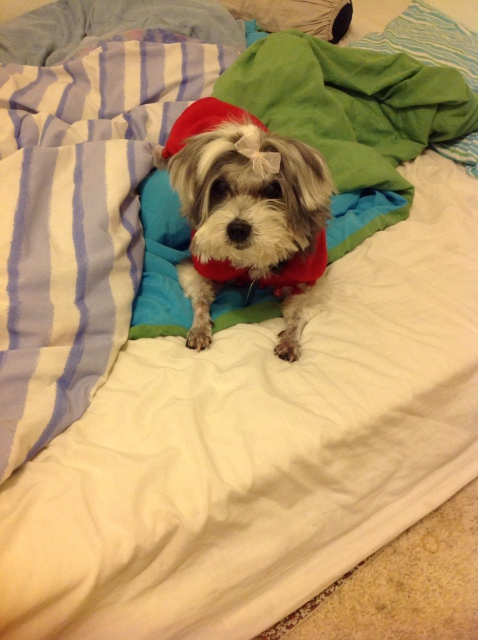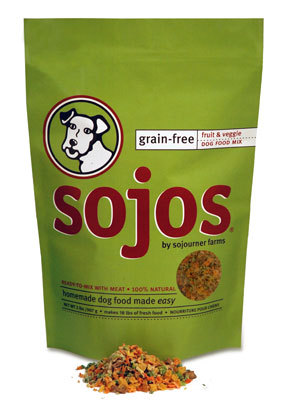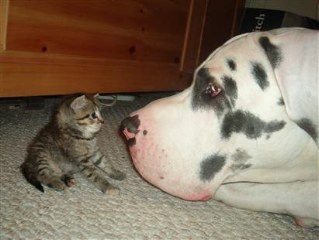QuestionQUESTION: My veterinarian recommended a low-protein diet for my cat who was exhibiting seizure-like symptoms (not dramatic like grand mal, but they were uncomfortable and scared the cat). I fed him Spot's Stew successfully for some months (about 5% protein), but now the price has risen so high I can't afford it. I have begun to feed a canned cat food from Trader Joe's (very cheap, no by-products, nutritional analysis similar to high-end canned foods, about 9% protein) 1 x 1.25 with cooked vegetables and some cod liver oil. I am concerned that the taurine and other supplements in the canned food will not be sufficient when diluted with the vegetables. Can you advise me about correct amounts of supplements to add and if you know any cheaper online sources? Also how much oil can safely be fed and how to make all this more palatable for the cat. Thanks.
ANSWER: Hi Jane
I am not a huge expert on cats, but can give you the following information based on Diane Stein and Dr. Pitcairn DVM, who both subscribe to natural healing for pets:
Feed daily, 1 teaspoon of Powder mix and 1 teaspoon of Oil mix, mixed in with regular food.
Cat Powder Mix:
1/2 cup nutritional (brewer's) Yeast
1/4 cup bone meal
1/4 cup kelp powder
Cat Oil Mix:
3/4 cup flaxseed oil
1/4 cup cod liver oil
20-40 IU Vit E.
Mix and/or shake all ingredients together well and store in sealed jars (one for oil, one for powder). Keep oil in refrigerator and powder in dark cupboard. Use dark glass bottles in possible. If using supermarket pet foods reduce or omit the bone meal all together, and use less cod liver oil as both these are present in the supermarket brands already. If feeding fresh meat then keep them in.
Or, try this mix:
You can also buy preservative-free cat food in cans and add the following Vitamin-Mineral Mix - 1 teaspoon of mix, twice per day:
1-1.5 cups Brewers/Nutritional Yeast
1/4 cup kelp powder
1 cup lecithin granules
In addition give your cat, ONCE PER WEEK:
400 IU Vit E (alpha-tocopherol, not mixed tocopherol),
10,000 IU Vit A, and
400 IU Vit D.
These oil capsules can simply be pierced and squirted onto your cat's dinner once per week.
This information was taken from "Natural Healing for Dogs & Cats" by Diane Stein.
While the oils are necessary to good health, too much can cause problems with the liver, so keep within these guidelines. Do not feed your cat dry cat food as this has been shown to cause kidney damage.
Holistic Animal Medicines (www.holisticanimalmedicines.com) have a homeopathic remedy for Epilepsy in cats, and
www.herbal-treatments.com have a liquid herbal remedy for cats with epilepsy. You may want to look into these products to add to your cat's daily routine. These remedies will help to sort through the emotions behind the reason your cat has seizures, and will also work on the physical level of treating the problem.
I hope this gives you some help.
With thanks,
Silva.
www.roxysworld.com.au
---------- FOLLOW-UP ----------
QUESTION: This is a great answer. Thank you. I don't see taurine in the supplements, though. Is it part of one of the things you listed or do I need to give it separately?
His seizures were not diagnosed as epilepsy, and I've observed a direct correlation with the amount of protein he takes in. They manifest as suddenly jumping up, running (nowhere in particular), and and then obsessively licking a place in the center of his back until the feeling subsides. It helps if I pick him up and rub the place he licks. He also used to do a sort of fly-catching snapping with his mouth, but I haven't seen that for a while.
I will get that book. I actually had it once but assumed it was now out of date and tossed it in a fit of house cleaning.
AnswerHi again Jane,
Taurine is an essential amino acid and is primarily used for heart problems in pets. It also helps keep diabetes and eye degeneration at bay and keeps teeth healthy. It is essential for cats and by law has to be included in all commercial cat foods. For regular heart health it is recommended to use 250 mg - 500 mg per day, dependent on the size of your cat.
Taurine is found naturally in meat & seafood. Commercially prepared cat foods have been fortified with taurine since the 1970's. Taurine deficiency is most commonly seen in cats who are given dog food in their diet.
Taurine begins to degrade when cooked, especially in water. If you are feeding a home prepared diet, please speak to your veterinarian to ensure that all your cat's nutritional needs are being met.
In Chinese Medicine it is stated that seizures and other central nervous system problems are a cause of Liver dysfunction. Windy environments, toxic conditions in the air or water, too much fat in the diet or a high volume diet can all over-tax the Liver. Emotions such as anger, frustration and aggression can also damage the Liver. Is there any reason why your cat may be exhibiting any of these emotions (such as a new kitten, change in household etc..).
Chlorophyll (a fifth of human dose)and Vit E both help balance the Liver, as does a sprinkling of Alfalfa powder.
Also give him filtered water if possible to eliminate any minerals or toxins that could be setting him off.
Have you tried him on hard boiled eggs, fish such as cod, or rabbit? These are good protein sources that may not have the same effect on his body as other types of red meat do.
Jane - for further information on Feline Nutrition have a read of some of the articles on this site: http://www.felinefuture.com/nutrition
They have some brilliant information on home made diets, taurine and other interesting info.
I hope all of this helps you and your cat.
Thanks,
Silva.
www.roxysworld.com.au

 Liver problem
Question
Jojo
Hello. My jojo (17 yrs. old dog) b
Liver problem
Question
Jojo
Hello. My jojo (17 yrs. old dog) b
 maltese with ACL tear and yorkie with chornic gastritis
QuestionHello!
I have a maltese that just got an ACL te
maltese with ACL tear and yorkie with chornic gastritis
QuestionHello!
I have a maltese that just got an ACL te
 my
QuestionQUESTION: I am trying so hard to get informatio
my
QuestionQUESTION: I am trying so hard to get informatio
 Fall/Winter Allergies
QuestionQUESTION: Good Day! My 4yr. old German Shepherd
Fall/Winter Allergies
QuestionQUESTION: Good Day! My 4yr. old German Shepherd
 Supplements for Bichons
QuestionWe have two Bichon Frise (11yrs and 13 yrs.) &n
Supplements for Bichons
QuestionWe have two Bichon Frise (11yrs and 13 yrs.) &n